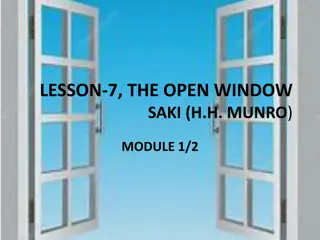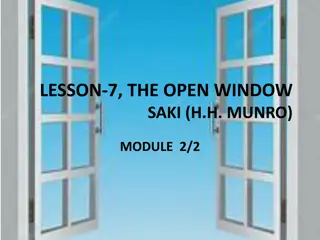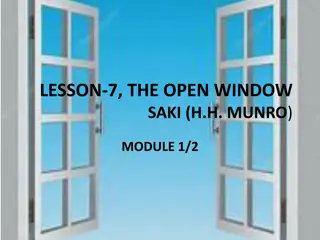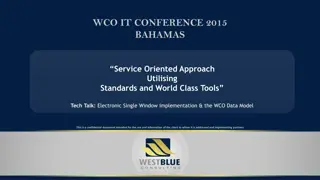Exploring 'The Open Window' by Saki: Themes and Key Words
Delve into the intriguing world of Saki's short story "The Open Window." Uncover the themes of appearances versus reality, sequence of events, and the power of enhancing vocabulary through this engaging narrative. Discover the story's plot intricacies and explore the essence of the characters' actions and motivations.
Uploaded on Sep 06, 2024 | 0 Views
Download Presentation

Please find below an Image/Link to download the presentation.
The content on the website is provided AS IS for your information and personal use only. It may not be sold, licensed, or shared on other websites without obtaining consent from the author. Download presentation by click this link. If you encounter any issues during the download, it is possible that the publisher has removed the file from their server.
E N D
Presentation Transcript
Lesson 7 (It so happened) The Open Window By Saki
About the Author Hector Hugh Munro (Dec 18, 1870 - Nov 14, 1916) was a witty British author who published under the pen name SAKI or H.H. Munro. The inspiration for the pen name "Saki" is unknown, it may be based upon a character in a poem or on a South American monkey. Given Munro's intellect, wit, and mischevious nature it's possible it was based on both simultaneously. As a writer, Munro (Saki) was a master of the short story form and is often compared to O. Henry and Dorothy Parker. E.F. Benson shares his sardonic style.
Key Words contd. self-possessed: calm and confident; sure of herself endeavoured: tried flatter: make (her) happy Suggest masculine habitation: suggest that the room belonged to a man moor: grassland treacherous: dangerous (though it seems safe) bog: wet, spongy ground (one may sink into it) falteringly: a faltering voice is shaky, hesitant; haltingly
Key Words contd. bustled: entered (the room) noisily whirl of apologies: many apologies (in quick succession) snipe: water bird that lives in marshes rattled on: went on scarcity of birds: no birds or very few ( scarcity means acute shortage)
Key words contd. muster: (here) use; collect or gather staggered: felt weak/unsteady (due to the blow) assailant: the person who attacks; (here) enemy/ adversary swaying: moving from side to side (in the fight) spluttering: speaking quickly/confusedly
Key words contd. straying: moving (she was not looking at him) delusion: false impression or belief Ailments and infirmities: (relating to health) complaints of sickness/weakness Sympathetic comprehension: understanding and showing sympathy uncanny coincidence: unnatural/unexpected/strange event
Objective Students will be able to: Understand the theme of the lesson- Apperances versus reality Sequence events Enhance vocabulary Complete exercise at the end of the story
Key points Framton Nuttel has bad nerves. He retires to the country for cure, and calls on a family friend. The lady being busy upstairs, her young niece refers to a family. mishap with focus on the open window. Mrs Sappleton comes down at last and inadvertently confirms her niece s story.
Key Points Framton tries to acquaint his host with the nature of his ailment. Through the open window, he can see things that worsen his nerves. What else can Framton do but beat a hasty retreat! Had he seen a ghost? The niece does have a knack for explaining an uncanny coincidence.
Learning Outcomes Understand author s style of writing. Infer, analyze and evaluate text. Enhance effective functional communication To sensitize students about the social responsibility of a successful person. Assume responsibility as responsible global citizens.























